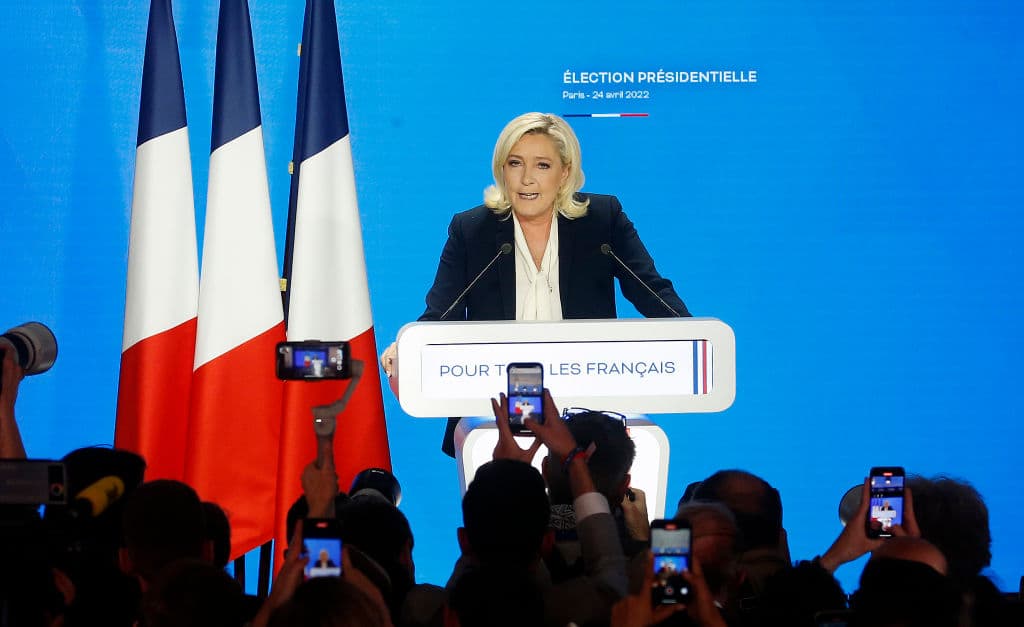Leader of France’s Rightist Party, Marine Le Pen, in a Sharp Turn After Attack by Hamas, Voices Strong Support for Israel
The long-awaited development that may change the pattern of French politics.

The leaders of the French National Rally party, Marine Le Pen and Jordan Bardella, in a sharp turn that could change the pattern of politics in France, have issued separate statements of support for Israel in the wake of the Hamas terrorist onslaught.
Mme. Le Pen wrote on the website X, known formerly as Twitter: “Terrorism cannot be tolerated and the security of the Israeli people is non-negotiable. The strikes by the Hamas terrorist group against Israeli territory are an unacceptable act of war that pushes any hope of peace further and further away every day. In these difficult times, we stand more than ever alongside Israeli democracy.”
Monsieur Bardella, who succeeded Mme. Le Pen as National Rally chairman in 2021 and acts, for all practical matters, as her closest assistant, went even further: “Pledging support for Israel and the Israeli people facing a large-scale terrorist and Islamist attack, coordinated by Hamas from Gaza. Let us hope this time, for the honor of France, that some people refrain from justifying the worst.”
These are the most pro-Israel pronouncements both leaders have ever made. Marine’s father, Jean-Marie Le Pen, who founded and led the National Front — the National Rally’s forerunner — managed to be at the same time an old-fashioned anti-Semite, a critic of Arab and Islamic immigration to France, and a close friend and supporter of Saddam Hussein’s Iraqi regime.
When Marine Le Pen took over the National Front from him in 2011 and turned it into a more mainstream populist party, she repudiated anti-Semitism and ventured to express some sympathy for Israel, albeit in vague and ambivalent terms. In 2022, when she was running as the National Rally candidate in the presidential election, she coyly said she did not plan “to deviate from… the constancy of French diplomacy” by moving the French embassy to Jerusalem from Tel Aviv.
Moreover, Mme. Le Pen, in interviews with the Israeli media, suggested Jerusalem should be placed “under international protection” and serve as a dual capital for Israel and a Palestinian State. On Iran, however, she acknowledged that Teheran was “still seeking to circumvent the limits concerning its nuclear program.”
Clearly, the National Rally is now stepping up the tone. For one thing, its base is increasingly convinced that Israel and France have a single common enemy — radical Islam — and that what happens now in Israel, or what national defense policies Israel must resort to, is a blueprint for France’s short-term future. Several RN members of Parliament have been saying it openly.
Moreover, support for Israel can be a building block for a Le Pen victory in the next presidential election in 2027. Mme. Le Pen’s decisive asset, so far, is that the centrist president, Emmanuel Macron, cannot run for a third term under a constitutional amendment passed in 2008 and that no other centrist compares to him.
The latest electoral polls so far suggest that Mme. Le Pen may get 32 percent in the first round, well ahead of Macron’s presumptive heir, Edouard Philippe, who is polling at 22 percent, or the Left radical Jean-Luc Mélenchon, who is getting 17 percent. To be elected in the second round, however, she would have to win the classical conservative vote as well — and even Mr. Macron’s most conservative wing.
A second reason why the National Rally is turning more vocally pro-Israel is that the entire political class is doing it, including the socialists and the ecologists. The only group who expressed pro-Hamas views was Jean-Luc Mélenchon’s Far Left party LFI, which is courting the growing French Muslim vote. Even so, several LFI members of Parliament did not agree with that line.
The ghastly killings and abductions in Sderot and other Negev communities stirred repressed memories of similar tragedies that befell France since 2012, from the pointblank murder of Jewish children in Toulouse to the massacre at the Bataclan Theater, and from the slaughter during a Catholic mass of the 86-year-old priest, Jacques Hamel, to the beheading of high school teacher Samuel Paty. These crimes dovetailed as well with more recent experiences, like the ethnic and religious riots and arsons that in June rocked all of France, including small, quiet rural communities.
Revulsion toward radical Islam runs so high nowadays that 81 percent of the French supported last summer the new Macronist minister of Education, Gabriel Attal, when he banned the abaya, an Islamic dress for women, at all public schools. More significantly, liberal or leftwing voters did not differ much on this issue from conservatives or right-wingers: 79 percent of the ecologists, 73 percent of the socialists and even 58 percent of the Mélenchon voters supported the ban.
Last but not least, the National Rally may be taking in account the other European countries. Support for Israel has never been so widespread since the Six Days War in 1967. In Berlin, Chancellor Olaf Scholz posted an image of the iconic Brandenburg Gate lit up with the blue-white Israeli flag. In Rome, the Prime Minister’s office was lit up in the same fashion. In Paris, the Eiffel Tower lights were turned off to express anger at the Hamas outrage and concern for the victims and hostages.
Mme. Le Pen is focusing, in particular, on the Italian prime minister, Giorgia Meloni, the leader of Fratelli d’Italia, a party similar to the French National Rally. Shortly before acceding to the premiership one year ago, Signora Meloni stated: “I believe that the existence of Israel is vital, and I will make every effort to invest in greater cooperation between our countries.” It brought her luck.

